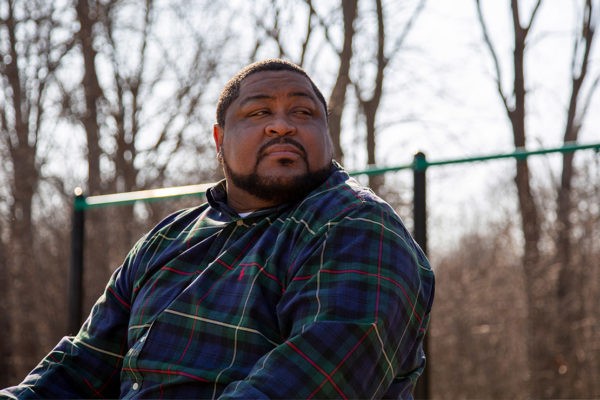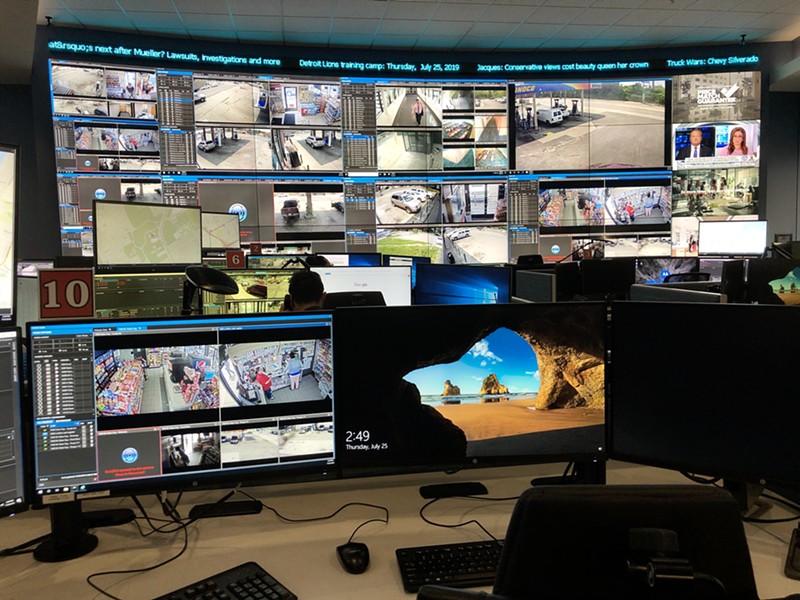Civil rights activists on Friday announced a “groundbreaking settlement agreement” in connection with a lawsuit filed by a Black man who was arrested by Detroit police based on a false facial recognition match.
Robert Williams was arrested in front of his wife and young daughters at his Farmington Hills home in January 2020 after the facial recognition system incorrectly flagged him as a shoplifting suspect. He was locked up for 30 hours in an overcrowded detention facility where he was forced to sleep on a cement floor.
Based on two blurry surveillance photos, Williams was accused of stealing watches from a Shinola store in Detroit in 2018.
In April 2021, the ACLU of Michigan filed a federal lawsuit on behalf of Williams, alleging the police department violated his Fourth Amendment rights and that his wrongful arrest was in violation of the Michigan Elliott-Larsen Civil Rights Act.
Williams is among at least three innocent Black people who have been arrested by Detroit police due to a false facial recognition match.
Featured in the far-reaching settlement are restrictions in how the Detroit Police Department can use facial recognition technology.
The core components of the settlement include:
-
Prohibiting police from arresting people based solely on facial recognition results or photo lineups following a facial recognition search.
-
Banning police from conducting lineups based solely on facial recognition leads without independent and reliable evidence linking a suspect to a crime.
-
Mandating police training on the risks and dangers of facial recognition technology and highlighting its higher misidentification rates for people of color.
-
Requiring an audit of all cases in which facial recognition technology was used to obtain an arrest warrant since 2017.
Over the next four years, the U.S. District Court will retain jurisdiction of the case to ensure the agreement is enforced.
“The Detroit Police Department’s abuses of facial recognition technology completely upended my life,” Williams said. “My wife and young daughters had to watch helplessly as I was arrested for a crime I didn’t commit and by the time I got home from jail, I had already missed my youngest losing her first tooth and my eldest couldn’t even bear to look at my picture. Even now, years later, it still brings them to tears when they think about it.”
Civil right activists say the settlement is important because facial recognition technology is significantly flawed, inevitably leading to false arrests.
The technology has come under increasing fire after studies have shown that the software misidentifies people of color more often than white people, which Metro Times reported in a cover story in July 2019.
While Detroit has embraced the technology, at least 25 cities have banned it.
“This settlement finally brings justice to Detroit, and the Williams family, after years of fighting to expose the flaws of this dangerous technology,” Phil Mayor, senior staff attorney at the ACLU of Michigan, said. “Police reliance on shoddy technology merely creates shoddy investigations. Under this settlement, the Detroit Police Department should transform from being a nationwide leader in wrongful arrests driven by facial recognition technology into being a leader in implementing meaningful guardrails to constrain and limit their use of the technology.”
Nationwide, at least six people have reported being falsely arrested based on flawed facial recognition matches. All have been Black.
Three of those cases were in Detroit.
In February 2022, Porcha Woodruff was eight months pregnant when six cops arrested her at her home in Detroit based on a false facial recognition match. She spent 11 hours at the Detroit Detention Center and was charged with robbery and carjacking. A month later, the Wayne County Prosecutor’s Office dismissed the case.
The technology also misidentified Michael Oliver in July 2019. Oliver was arrested and falsely accused of stealing a teacher’s cellphone and throwing it. He also filed a lawsuit against the city.
“We hope this groundbreaking settlement will not only prevent future wrongful arrests of Black people in Detroit, but that it will serve as a model for other police departments that insist on using facial recognition technology,” Michael J. Steinberg, director of the Civil Rights Litigation Initiative at the University of Michigan Law School, said. “We are also thrilled that Mr. Williams, who has become a face of movement to stop the misuse of facial recognition, will receive some measure of relief.”
In a statement to Metro Times, Detroit Police Chief James White said his department raised the standards for making an arrest based on facial recognition matches after Williams was misidentified. Under the newer policies, police can only use matches as a tip to further an investigation, and matches cannot be the sole basis for an arrest.
But even under the new policies, police arrested the other two Detroiters who were later found to be victims of faulty matches.
“The Department is pleased with its work with the ACLU and University of Michigan over the last year and a half and that our new facial recognition policy, we firmly believe will serve as a national best practice and model for other agencies using this technology,” White said. “While the work DPD and the ACLU may differ, our goals are similar — to ensure policing is done in a fair, equitable, and constitutional manner.”
Less than a year before Williams was arrested, Detroiters urged the city’s Board of Police Commissioners to ban the technology, saying it would lead to false arrests. But the commissioners and Mayor Mike Duggan stood behind the technology, saying it wouldn’t be abused.
Detroit’s facial recognition software is especially pervasive because it’s used on an ever-expanding surveillance network of high-definition cameras under Duggan’s Project Green Light, a crime-fighting initiative that began in 2016 at gas stations and fast-food restaurants. Since then, the city has installed more than 500 surveillance cameras at parks, schools, low-income housing complexes, immigration centers, gas stations, churches, abortion clinics, hotels, health centers, apartments, and addiction treatment centers. The city also installed high-definition cameras at roughly 500 intersections at a time when other cities are scaling back surveillance because of privacy concerns.
Williams said everyone should be worried about facial recognition.
“The scariest part is that what happened to me could have happened to anyone,” Williams said. “But, at least with this settlement, it will be far less likely to happen again to another person in Detroit. With this painful chapter of our lives closing, my wife and I will continue raising awareness about the dangers of this technology.”
The ACLU still supports a ban on the technology.
“The multiple wrongful arrests by police in Detroit and other American cities show that face recognition technology is fundamentally dangerous in the hands of law enforcement,” said Nathan Freed Wessler, deputy director of the ACLU Speech, Privacy, and Technology Project. “The most effective way to avoid abuses is for lawmakers to ban police use of the technology, as city councils from Boston to Minneapolis to San Francisco have done. But in jurisdictions where lawmakers have yet to act, police departments should look to Detroit’s new policies, which will seriously mitigate the risk of further false arrests and related harms.”


